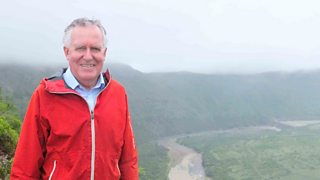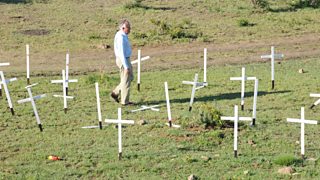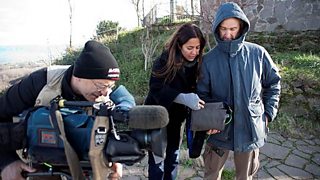South Africa: The Massacre That Changed a Nation
Producer and director John Thynne, on the making of South Africa: The Massacre That Changed a Nation
The mountain path before us was steep and rain ran down it in rivulets causing any semblance of a road to disintegrate into no more than a slippery track. On either side, sheer drops to the valley below beckoned. This was not an enticing country walk: our destination was uncertain, visibility low, weather foul and we didn鈥檛 have much time. But we had no choice.

Two and a half hours out of East London in the Eastern Cape of South Africa our four by four had been defeated by nature. We watched with horror as the vehicle ahead of us careered backwards down the mountain, unable to grip the disintegrating road. Denver, our driver, wisely pronounced that he wasn鈥檛 going to try it. So our journey had come to an inglorious end on a small track a few kilometres short of our destination.
We were trying to get to the village of , perched on a mountain top, high up above the Mbashe river; but why had the 大象传媒 decided to take the Labour MP Peter Hain (pictured) to visit this remote outpost?
Unusual significance听
In making a film that looked at South Africa, 18 years after the , the village had taken on an unusual significance. It was the home of Mafolisi Mabiya, a platinum miner killed in the , three months earlier.
We talked. The village we were heading for could be reached on foot. Half an hour at most, our fixer Mr Lobi told us. I had by now become used to rather optimistic estimations of time and distance. But to turn back now was not so much an admission of defeat, as a waste of a precious day鈥檚 filming.
Besides, this journey had been planned for weeks. I had seen the village we were heading for on a map back in London. Optimistically perhaps, I had reckoned we could reach it, film, and get back in time to catch a flight onto Johannesburg, where we were due to interview the next day. The world is full of possibilities when you are in a warm office in London, far from the realities of African roads.
We all agreed to walk.
Over an hour later, at the top of the slithery path, two child goatherds, stared in disbelief as our bedraggled team emerged from the mist.
Extremely basic
Here in the rolling green mountains of the Transkei, the world of South Africa鈥檚 wealthy cities seemed far further than the thousand kilometres on the map. The life here was extremely basic as the Khosa people eked out an existence off the land with the same customs, skills and traditions as their people had for thousands of years. There was no water or electricity; no tractors or fertilisers; just sheer hard work.
The miner鈥檚 family we were looking for lived in a cluster of three rondavels. An old man watched us slowly and silently as our fixer Mr Lobi tried to find the miner鈥檚 widow. But she wasn鈥檛 there. She had gone to the nearest town to seek some government assistance for her plight. Mafolisi had supported not just his wife and children but parents and cousins too on his salary from the mine.
I looked at my watch; we would have to turn back soon. The whole journey might have been in vain after all. But then Lobi spoke to an old lady who turned out to be the miner鈥檚 mother. She fiddled nervously with her foot in the mud as Lobi communicated our simple interview questions to her. Tears began to stream down her face, which she quickly wiped away with her headscarf.
As we left the village the mist began to descend again, until visibility was no more than ten metres. Up ahead, Peter marched on in front, his red raincoat flapping in the wind.
Dignified figure
And then a curious thing happened. Out of the mist there appeared a figure in green. A lady wearing a green cape and green headscarf carrying heavy bags, and with a child strapped to her back with a blanket, staggered towards us. We all knew instinctively it was the widow. Her face was glazed with shock. Shock of the direction her life had taken recently. And now shock at meeting in her village, four men who had come looking for her.
As she returned to her village and we headed back to our lives, I turned and watched as this dignified figure in green disappeared once more into the mist. Whatever had happened to South Africa in the eighteen years since the end of apartheid, not much had rubbed off on these people.
Related clips
-
![]()
Peter Hain MP investigates the killing of 34 protesting miners in Marikana.
-
![]()
Read more articles from the producers and directors of This World.


